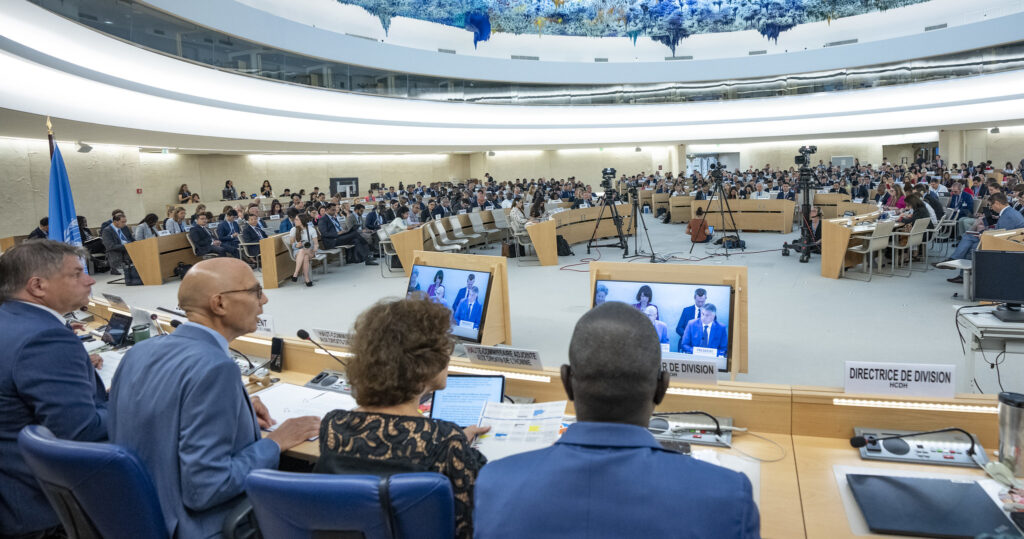You can find all the statements delivered during this session below as they become available. Our past advocacy interventions are available here.
Item 10: General Debate – The Philippines (11 October)
Considering the prevailing impunity in the Philippines, we called on the Council to not only renew the mandate of the UN Joint Program on Human Rights in the country but to reconfigure its mandate to improve human rights accountability mechanisms. This extension should include a monitoring and reporting element, a counterpart role for domestic institutions, and meaningful participation for victims and their families. The program should also encourage the government to cooperate with the International Criminal Court.
Item 10: Interactive Dialogue on the report on the Democratic Republic of the Congo (9 October)
The human rights situation in the Democratic Republic of the Congo (DRC) remains dire, with continued armed clashes that result in massive population displacements and unlawful killings. While welcoming the reports of the High Commissioner and international experts, we pointed out the lack of mention of mineral resources governance. Indeed, the expansion of industrial mining in the country, particularly of cobalt and copper, has led to forced evictions, threats, and other human rights abuses. Furthermore, mining has had a devastating impact on human health, biodiversity, and food security. In that regard, we asked the Council to consider the challenges surrounding extractive resources governance in its technical assistance.
Items 3&5: Interactive Dialogue with the Expert Mechanism on the Rights of Indigenous Peoples – Guatemala (28 September)
During the armed conflict in Guatemala, the militarization of Indigenous lands spurred serious human rights violations including enforced disappearances, massacres, and forced displacement. However, the judicial system has failed to hold perpetrators to account, and a new initiative could grant amnesty to military personnel who committed these crimes. Moreover, the militarization of Indigenous lands continues to this day – 85 communities have been extrajudicially evicted since 2022. We called on the Human Rights Council to urge Guatemala to protect and respect the rights of Indigenous People, including their right to free, prior, and informed consent.
Items 3&5: Interactive Dialogue with the Expert Mechanism on the Rights of Indigenous Peoples (28 September)
In a joint statement, we expressed our appreciation to the Expert Mechanism for their report on the militarization of Indigenous lands, in particular for giving visibility to the effects on economic, social, and cultural rights, as well as for including its view on the role of business opportunity. We also took the opportunity to raise three cases from Brazil, Guatemala, and Nicaragua where the rights of Indigenous Peoples continue to be violated.
Annual Panel on the Rights of Indigenous Peoples – Guatemala (27 September)
Ostensibly to “develop the country,” Guatemala has opened the door to national and transnational companies as well as extractive projects. Often undertaken without consultations or free, prior, and informed consent of the affected communities, these projects have a disproportionate impact on the rights of Indigenous women through the exploitation of labor and unpaid work. In this joint statement, we urged all States to respect their international obligations and guarantee Indigenous women meaningful roles in decision-making processes.
Item 4: General Debate – The Philippines (27 September)
Victims and their families are still seeking justice for the human rights violations committed during the so-called ‘war on drugs’, waged by former President Duterte. Despite the commitments by a new administration to end extrajudicial killings, over 400 cases have been documented since in July 2022. Ms. Amelia Santos – whose husband was the victim of an extrajudicial killing in 2016 – raised the continued harassment and lack of support for victims and their families. She called on the Council to review whether its engagement with the Philippines has resulted in appropriate mechanisms toward enforcing accountability and ending impunity.
Item 3: Interactive Dialogue with the Special Rapporteur on toxic wastes (19 September)
In Colombia, extractive industries are allowed to expand without consultation of affected communities that suffer the consequences. For example, the ‘La Colosa’ mine in Cajamara has caused irreversible environmental damage to protected areas and contaminated water sources. Considering this, we called on the government to support the Environmental Democracy Bill, which would help guarantee meaningful consultations of communities, prevent further environmental degradation, and compel action to mitigate the damage already caused.
Item 3: Interactive Dialogue with the Special Rapporteur on water and sanitation – Solomon Islands (14 September)
Logging in the Solomon Islands limits the access to water of local communities and damaged aquatic ecosystems in the country. In this light, we welcomed the recommendation by the Special Rapporteur that companies must be held accountable for the degradation of aquatic systems and be forced to comply with their obligations to repair and compensate for these damages. Highlighting several challenges from the Solomon Islands, we called on the government to implement the commitments it made during its last Universal Periodic Review.
Item 2: General Debate – Guatemala (13 September)
In 2022, more than 3.574 attacks against individuals, organizations, and communities that defend human rights were documented in Guatemala. The human rights crisis that has engulfed the country is worsened by attempts to weaponize the judiciary to delegitimize the recent presidential elections. In a joint statement, we asked the Council to urge all Guatemalan institution to respect the will of the people and guarantee that election officials, journalists, and human rights defenders can carry out their work without fear of intimidation.
Thumbnail: UN Photo / Jean Marc Ferré

